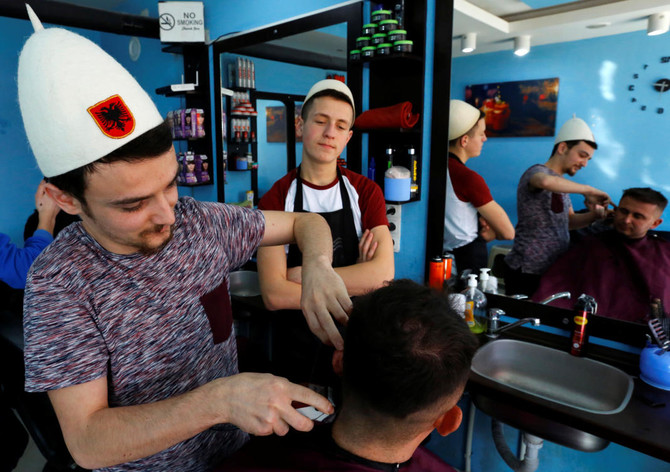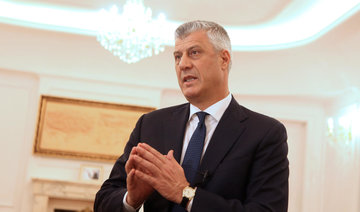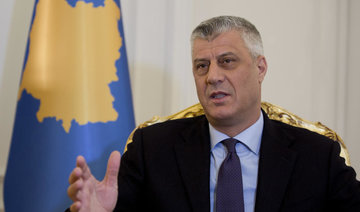PRISTINA, Kosovo: Every country has a national anthem, a musical compilation that aims to stir patriotic emotion, and Kosovo is no exception. Except for one peculiarity: its anthem has no lyrics.
Ten years after the former Serb territory declared independence and nearly two decades after it was engulfed in war between ethnic Albanian separatists and Yugoslav government forces, there is still difficulty in finding someone able to pen words of unity for Europe’s newest country without causing offense to one of its ethnic groups.
“The text should be written in a way that does not leave the impression to the minorities they are threatened or offended,” said Mendi Mengjiqi, who composed the anthem in June 2008, just a few months after Kosovo’s Feb. 17 declaration of independence.
So far, no attempts have been successful.
A decade after its independence, Kosovo seems to have all the trappings of a modern, if rather poor, Balkan country. The bombed-out buildings and tank tread-destroyed streets of the 1998-1999 war have been replaced by highways and shopping malls, bustling cafes and shiny new office complexes.
Construction cranes can be seen on the drive into Pristina, the capital, as workers busily build new homes and businesses.
“Kosovo is a joint success story, of the international community and the Kosovars,” President Hashim Thaci, a former commander of the rebel Kosovo Liberation Army, or KLA, told The Associated Press.
It was he who declared Kosovo’s independence in 2008, nearly nine years after NATO conducted a 78-day airstrike campaign against Serbia to stop a bloody Serb crackdown against ethnic Albanians.
Kosovo is recognized by 115 countries, including the United States and most Western powers, and has joined about 200 international organizations.
But Serbia, which for centuries has considered Kosovo the cradle of its civilization, still sees it as part of its own territory, and has the support of Russia and China. Five European Union members also do not recognize Kosovo’s independence.
A close look reveals a young country still struggling with nationhood.
The Serb minority, which was the territory’s politically dominant ethnicity before the war, lives in enclaves. Although people generally are no longer physically attacked for entering a different ethnic area, tension can be easily sparked. Some 4,500 NATO-led peacekeepers are still stationed in Kosovo to ensure nothing gets out of hand. Crime and corruption are rampant.
Kosovo Serbs, who live mostly in the northern Kosovo neighboring Serbia, are adamant that they not come under direct rule from Pristina. Serbia has rejected Kosovo’s statehood, but is pressed by the West to compromise with ethnic Albanians on “good neighborly relations” or jeopardize Serbia’s prospects of joining the EU.
Serbian officials have hinted they would recognize Kosovo as an independent state only if northern Kosovo is handed over to Serbia — a proposal flatly rejected by Pristina.
EU-mediated negotiations between Pristina and Belgrade, which began in 2011, will be key in the country’s progress, and have achieved significant improvements in the nation’s governance and conditions for minorities.
But substantial hurdles remain.
“Both Kosovo and Serbia should make drastic compromises, which I see as very difficult,” said Momcilo Trajkovic, a Kosovo Serb analyst and former politician living in the Serb enclave of Gracanica, near Pristina.
In January, moderate Kosovo Serb politician Oliver Ivanovic, one of the few who promoted the idea of Kosovo Albanians and Serbs living together, was gunned down outside his office in northern Mitrovica, the edge of the Serb-dominated part of northern Kosovo. His murder was condemned by both Pristina and Belgrade.
The key issues facing Kosovo now are “rule of law, fighting unemployment, corruption and organized crime and progressing in the talks with Serbia face Kosovo,” said US Ambassador to Pristina Greg Delawie.
Kosovo hopes one day to join the EU and has begun the first step but still has a long way to go.
“I very much hope that with good homework we could increase the speed of our expectation toward EU, NATO, United Nations and other memberships,” said Prime Minister Ramush Haradinaj, also a former KLA commander.
The EU’s special representative to Kosovo, Nataliya Apostolova, said progress had been made in the past decade between the nation’s two ethnic groups but “fragility persists, and can be easily tested even by a train, a wall or an improper initiative.”
But, she noted, the biggest concern for Kosovo’s people is economics.
If there is one issue that the country’s Serbs and Albanians can agree on, it’s the lack of job prospects and the nation’s crushing unemployment, which in 2017 ran at 30.5 percent. Youth unemployment stands at 50.5 percent, according to the Kosovo Agency of Statistics.
A Pristina apartment can easily go for 1,000-1,500 euros ($1,238-1,857) per square meter and it costs half a million euros ($619,000) for a villa at the Marigona Residence, five miles from Pristina, where the country’s prime minister lives. But that is not affordable in a nation where the average salary is about 360 euros ($450) a month.
With their future looking bleak, many youngsters long to leave.
“When will we have visa-free travel so I can get to Germany or Switzerland and build a better life?” wondered Shait Krasniqi, a 28-year-old economics graduate who works as a waiter in Pristina. “There are no prospects here, especially for us, the young people.”
Kosovo has a young population and with the jobless rate so high, many pack the capital’s cafes, nursing a single coffee for hours.
“If my uncles did not live in Switzerland and support us, my family would die,” said Ilir, a young cafe client who was too embarrassed to give his last name. “My father gets a little money from selling agricultural products he grows from our small land. No other jobs for me or my sister.”
In the Serb enclave of Gracanica, home to a medieval Serb Orthodox monastery, the sentiments are the same.
“Regardless of ethnicity, the situation is grave for all the people,” said Mirjana Vlasacevic, a 57-year-old court employee in Gracanica. “That is the reason that they, the youngsters, are looking to leave.”
Challenges ahead as Kosovo, Europe’s newest nation, turns 10
Challenges ahead as Kosovo, Europe’s newest nation, turns 10

Italian police fire tear gas as protesters clash near Winter Olympics hockey venue

- Police vans behind a temporary metal fence secured the road to the athletes’ village, but the protest veered away, continuing on a trajectory toward the Santagiulia venue
MILAN: Italian police fired tear gas and a water cannon at dozens of protesters who threw firecrackers and tried to access a highway near a Winter Olympics venue on Saturday.
The brief confrontation came at the end of a peaceful march by thousands against the environmental impact of the Games and the presence of US agents in Italy.
Police held off the violent demonstrators, who appeared to be trying to reach the Santagiulia Olympic ice hockey rink, after the skirmish. By then, the larger peaceful protest, including families with small children and students, had dispersed.
Earlier, a group of masked protesters had set off smoke bombs and firecrackers on a bridge overlooking a construction site about 800 meters (a half-mile) from the Olympic Village that’s housing around 1,500 athletes.
Police vans behind a temporary metal fence secured the road to the athletes’ village, but the protest veered away, continuing on a trajectory toward the Santagiulia venue. A heavy police presence guarded the entire route.
There was no indication that the protest and resulting road closure interfered with athletes’ transfers to their events, all on the outskirts of Milan.
The demonstration coincided with US Vice President JD Vance’s visit to Milan as head of the American delegation that attended the opening ceremony on Friday.
He and his family visited Leonardo da Vinci’s “The Last Supper” closer to the city center, far from the protest, which also was against the deployment of US Immigration and Customs Enforcement agents to provide security to the US delegation.
US Homeland Security Investigations, an ICE unit that focuses on cross-border crimes, frequently sends its officers to overseas events like the Olympics to assist with security. The ICE arm at the forefront of the immigration crackdown in the US is known as Enforcement and Removal Operations, and there is no indication its officers are being sent to Italy.
At the larger, peaceful demonstration, which police said numbered 10,000, people carried cardboard cutouts to represent trees felled to build the new bobsled run in Cortina. A group of dancers performed to beating drums. Music blasted from a truck leading the march, one a profanity-laced anti-ICE anthem.
“Let’s take back the cities and free the mountains,” read a banner by a group calling itself the Unsustainable Olympic Committee. Another group called the Association of Proletariat Excursionists organized the cutout trees.
“They bypassed the laws that usually are needed for major infrastructure project, citing urgency for the Games,” said protester Guido Maffioli, who expressed concern that the private entity organizing the Games would eventually pass on debt to Italian taxpayers.
Homemade signs read “Get out of the Games: Genocide States, Fascist Police and Polluting Sponsors,” the final one a reference to fossil fuel companies that are sponsors of the Games. One woman carried an artificial tree on her back decorated with the sign: “Infernal Olympics.”
The demonstration followed another last week when hundreds protested the deployment of ICE agents.
Like last week, demonstrators Saturday said they were opposed to ICE agents’ presence, despite official statements that a small number of agents from an investigative arm would be present in US diplomatic territory, and not operational on the streets.













